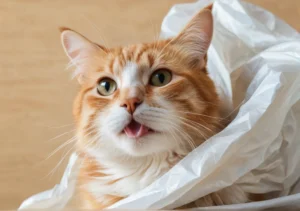Cats have a reputation for being mischievous creatures, always getting into trouble and causing chaos in our homes. But have you ever stopped to wonder why they act this way? Let’s explore the reasons behind our feline friends’ mischievous behavior.
The Curious Nature of Cats
Cats are like mini explorers, always on the lookout for their next adventure. Their natural instincts drive them to investigate every nook and cranny, from the top shelf of the bookcase to that mysterious paper bag left on the floor. It’s not that they’re intentionally trying to cause trouble; they’re just following their innate curiosity.
This inquisitive nature can lead them into mischief, as they may knock over a vase while inspecting a new scent or get stuck in a cabinet while chasing a toy mouse. Understanding that exploration is just part of a cat’s DNA can help us appreciate their mischievous ways and find ways to redirect their energy towards more appropriate activities.
Playful Predisposition
Cats are playful creatures by nature, always ready to pounce on a dangling string or chase after a feather wand. This playful spirit is a big part of what makes them so endearing, but it can also lead to mischief if not channeled in the right direction.
To encourage appropriate play and reduce the likelihood of mischievous behavior, it’s essential to provide interactive toys that stimulate their natural hunting instincts. Puzzle feeders, laser pointers, and scratching posts are great options to keep your cat engaged and entertained. Remember, a tired cat is a well-behaved cat, so regular play sessions can help prevent them from getting into trouble.
Unique Insight: One way to engage your cat’s playful nature and prevent mischief is by creating a DIY cat enrichment area in your home. This can include hiding treats in puzzle toys, setting up a “cat TV” with bird feeders outside a window, or even creating a DIY obstacle course using everyday objects. By stimulating their minds and bodies with fun activities, you can help satisfy their playful predisposition in a positive way.
Boredom Busters
Do you ever wonder why your cat gets into so much mischief? One common reason is boredom. Just like humans, cats can act out when they’re feeling restless and under-stimulated. To keep your feline friend entertained and out of trouble, provide interactive toys that encourage play, such as feather wands or puzzle feeders. Rotating toys daily can also prevent boredom. Another great way to engage your cat is through interactive play sessions using toys like fishing rods or laser pointers. Creating a cat-friendly environment with perches and scratching posts can also help fulfill their natural instincts. By keeping your cat mentally stimulated, you can help curb their mischievous behavior.
Seeking Attention
When your cat starts acting up, it may be their way of seeking attention. Cats are clever creatures, and they know just how to grab our focus. If your cat is engaging in mischievous behavior, consider whether they might be feeling neglected. Spend quality time with your furry friend through regular grooming sessions, interactive playtime, or even just cuddling on the couch. By providing the right kind of interaction and attention, you can help fulfill your cat’s social needs and reduce their desire to act out. Remember, a happy and fulfilled cat is less likely to get into trouble.
Additional Unique Insight:
Creating a structured play routine for your cat can not only keep them mentally engaged but also strengthen the bond between you and your pet. By setting aside dedicated time each day for interactive play or training sessions, you can provide a valuable outlet for their energy and attention-seeking behaviors. So, grab their favorite toy and make playtime a regular part of your daily routine.
Environment Enrichment
Curious why your feline friend is always getting into mischief? It might be because they’re bored out of their whiskers! Cats are natural hunters and explorers, so a lack of mental and physical stimulation can lead to a plethora of mischievous behaviors. To keep your kitty on the straight and narrow (or at least try to), provide plenty of enrichment in their environment. This can include interactive toys, scratching posts, perches, and puzzle feeders to keep them engaged and entertained. Remember, a bored cat is a recipe for chaos!
Importance of a Stimulating Environment
When it comes to cats, a dull environment can be the catalyst for all sorts of trouble. Cats need mental and physical stimulation to keep them happy and out of trouble. Ensure your feline friend has plenty of opportunities for play, exploration, and exercise to channel their energy in positive ways. Consider setting up a cat-friendly environment with climbing structures, cozy hiding spots, and engaging toys to keep boredom at bay. A stimulated cat is a well-behaved cat!
Training Techniques
So, your cat’s mischievous streak is starting to get under your skin? Fear not, you can teach an old cat new tricks! Training your cat can help redirect their mischievous tendencies and encourage more desirable behaviors. Positive reinforcement is key here, so be sure to reward good behavior with treats, affection, or playtime. With a little patience and consistency, you can help your furry friend learn the ropes and become a model citizen in no time.
Effective Training Methods
When it comes to training your cat, consistency is crucial. Use reward-based training to reinforce good behavior and ignore or redirect unwanted actions. Remember, cats respond well to positive reinforcement, so focus on praising and rewarding them for doing the right thing. Clicker training and target training can also be effective tools to teach your cat new behaviors. With a bit of time and effort, you can help your cat become a well-behaved member of the family.
Socialization Matters
Early socialization plays a crucial role in shaping a cat’s behavior. Cats that are properly socialized from a young age tend to be more well-behaved and less likely to engage in mischief. Interacting with other animals, humans, and experiencing different environments helps cats develop important social skills and learn appropriate boundaries. If a cat lacks socialization or has had negative experiences with other animals, they may exhibit more mischievous behavior as a way to assert themselves or seek attention.
Health Considerations
Regular vet check-ups are essential in understanding and addressing any underlying health issues that could be contributing to a cat’s mischievous behavior. Cats are masters at disguising discomfort or pain, so behaviors like excessive playfulness, knocking items over, or even aggression can sometimes be signs of an underlying health problem. Ensuring your cat is up-to-date on vaccinations, maintaining a healthy diet, and keeping an eye out for any changes in behavior can help catch health issues early and prevent them from escalating.
Unique Insight: Cats are often misunderstood when it comes to expressing pain or discomfort, so it’s important to be vigilant about any changes in behavior that could indicate an underlying health problem. If your usually calm cat suddenly becomes more mischievous or agitated, it might be worth scheduling a visit to the vet to rule out any health issues.
- Provide a balanced diet to ensure your cat’s overall well-being.
- Engage in regular play sessions to keep your cat mentally stimulated and physically active.
- Consider investing in interactive toys to challenge your cat’s mind and reduce their mischievous tendencies.
Fun Facts About Cat Behavior
Cats are often seen as mischievous creatures, but there are some interesting facts about their behavior that may shed light on why they act the way they do. Contrary to popular belief, cats are not intentionally trying to cause trouble when they knock things off shelves or hide in unexpected places. In fact, these behaviors can be attributed to their natural instincts and communication methods.
One fun fact about cats is that they have a strong hunting instinct, even if they are well-fed domestic pets. This drive to hunt and explore their environment can lead them to engage in playful antics that may seem mischievous to us. Additionally, cats are highly curious animals, always seeking out new sights, sounds, and smells to investigate. This curiosity can sometimes get them into trouble as they may accidentally break or damage items while exploring.
Another misconception about cats is that they are vindictive or purposely causing chaos. In reality, cats do not have a concept of revenge or spite like humans do. When a cat engages in seemingly mischievous behavior, it is usually just seeking attention, trying to release pent-up energy, or simply exploring its surroundings.
Understanding these fun facts about cat behavior can help us have a better appreciation for our feline friends and their unique personalities. By providing cats with plenty of enrichment, playtime, and mental stimulation, we can help curb their mischievous tendencies and strengthen our bond with them.
Common Misconceptions about Cat Behavior
Cats are plotting against you: Contrary to popular belief, cats are not scheming to make your life difficult. Their behavior is simply a result of their natural instincts and communication methods.
Cats are bored: When cats engage in mischievous behavior, it may be a sign that they are not getting enough mental or physical stimulation. Providing interactive toys, puzzle feeders, and playtime can help alleviate boredom and curb undesired behavior.
Cats are spiteful: Cats do not have the capacity for spite or revenge like humans do. If a cat acts out, it is likely due to stress, fear, or a medical issue rather than a deliberate attempt to cause trouble.
Cats are only mischievous: While cats can certainly be mischievous at times, they also have a gentle and affectionate side. By understanding and respecting their boundaries, you can develop a strong and loving relationship with your feline companion.
Alex, a passionate animal lover, has experience in training and understanding animal behavior. As a proud pet parent to two dogs and three cats, he founded AnimalReport.net to share insights from animal experts and expand his knowledge of the animal kingdom.




